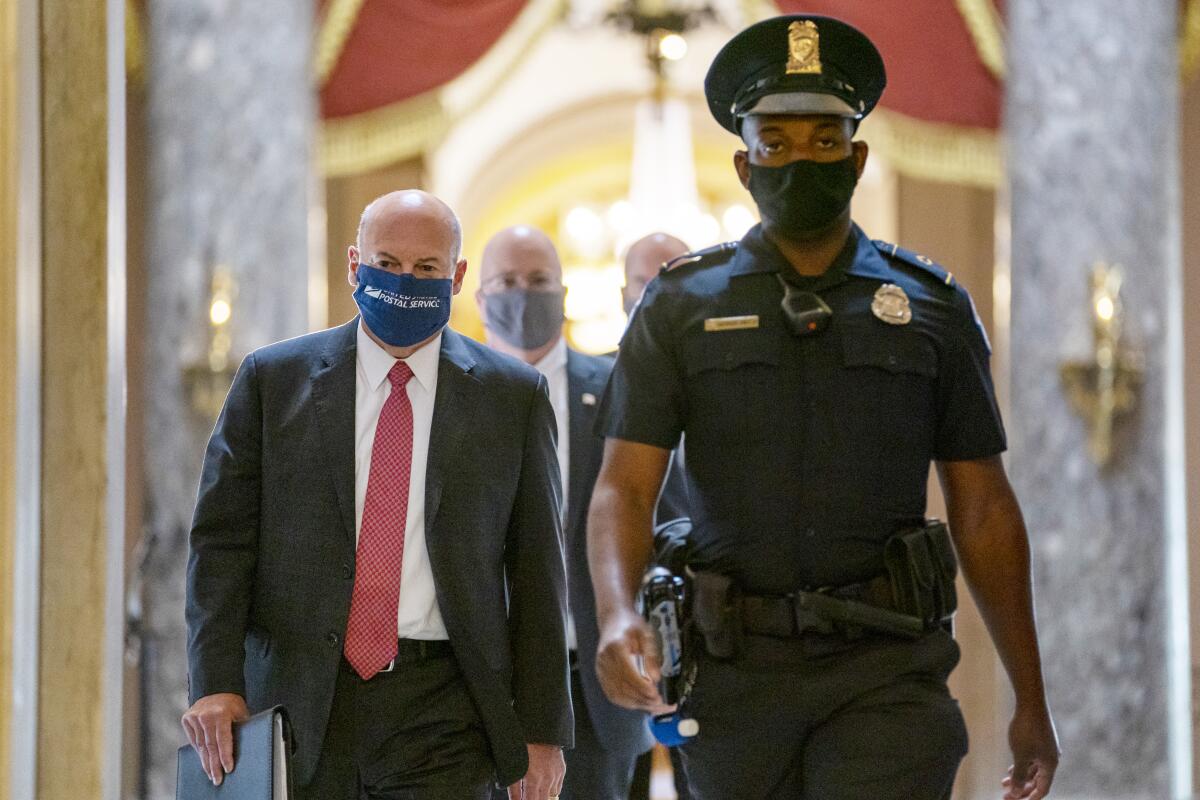Pelosi calls House back to Washington to deal with Postal Service crisis

- Share via
WASHINGTON — Spurred by fears that President Trump is trying to eviscerate the U.S. Postal Service to help him win reelection, Speaker Nancy Pelosi on Sunday abruptly summoned the House back to Washington this week to pass a bill aimed at rolling back administration cutbacks that could cripple widespread mail-in voting.
Congressional Democrats also called on the recently appointed postmaster general to testify Aug. 24 at an emergency hearing by a House committee about cost-cutting moves that led to steep slowdowns in mail service in much of the country over the last three months.
As election officials brace for a record number of mail-in ballots due to the COVID-19 pandemic, reports of worsening mail delays, shorter post office hours and greater service disruptions since May have raised alarms about potential voter disenfranchisement and political chaos after polls close Nov. 3.
In a “Dear Colleagues” letter, Pelosi called on the House, which is in summer recess until after Labor Day, to return to session this week to vote on a bill that would ban postal authorities from making “changes to operations or level of service” that were in effect Jan. 1, 2020.
The action reflects the growing national outcry over allegations that Trump and his allies are trying to deliberately undermine mail-in voting to help his reelection bid. Social media lighted up with concerns about the security of absentee ballots and complaints about unusually slow mail deliveries.
But Pelosi’s move also appeared partly symbolic because the Republican-led Senate will not return until after Labor Day, and it’s unclear whether they will take up the bill. Congress is already deadlocked on a coronavirus financial relief package that includes additional funding for the Postal Service.
“Alarmingly, across the nation, we see the devastating effects of the President’s campaign to sabotage the election by manipulating the Postal Service to disenfranchise voters,” Pelosi wrote.
She called Postmaster General Louis DeJoy, a major Trump donor, a “complicit crony” of the president, saying he has pushed “sweeping new operational changes that degrade postal service, delay the mail, and — according to the Postal Service itself — threaten to deny the ability of eligible Americans to cast their votes through the mail in the upcoming elections in a timely fashion.”
Earlier Sunday, House Democrats called on DeJoy, who was appointed the top postal official in May, to appear before an “urgent” hearing of the House Oversight Committee on Aug. 24 and to hand over documents on recent cost-cutting moves and staffing changes that are widely blamed for the mail backups.
Across the country, attorneys general from at least six states huddled over the weekend to discuss possible lawsuits against the Trump administration to block it from cutting mail service between now and the election, the Washington Post reported, while state elections officials scrambled to see if they could give voters more options.
The long-simmering crisis boiled over Thursday when Trump said he would reject a Democratic proposal to funnel $25 billion in extra funding to the Postal Service to help with the expected deluge of mail-in ballots — even though the agency’s board of governors, which Trump appointed, had recommended the $25-billion boost.
Trump acknowledged that starving the cash-strapped agency of fresh funds would compromise its ability to deliver ballots in a timely fashion.
On Friday, the Postal Service confirmed that it had issued a warning to 46 states, including California, of “significant risk” that some voters might be disenfranchised because it might not be able to meet state deadlines for delivering last-minute ballots.
The potential for problems is probably smaller in California than in many other states. California has long had one of the nation’s most generous laws in allowing extra time for ballots to be received by elections officials.
The state has gone even further this fall, requiring any ballot with an envelope postmarked by Nov. 3 to be counted as long as it arrives within 17 days of the election.
The Postal Service letter sent to California Secretary of State Alex Padilla acknowledged the “vast majority” of the state’s voters should not be affected by delays. Those who register in late October could face a greater risk of not receiving a ballot in the mail, though many counties will urge such voters to pick up a ballot in person.
As the controversy gathered steam, the agency’s inspector general, Tammy Whitcomb, separately announced an investigation of the cost-cutting measures by DeJoy, including elimination of overtime pay and removal of more than 600 high-speed mail-sorting machines, as well as mailboxes in some locales, including parts of California.
The election dispute has put the U.S. Postal Service, which traces its roots to 1775 when Benjamin Franklin was named the first postmaster general, in the crosshairs of a bitter partisan battle.
Polls show that Democrats are more likely than Republicans to vote by mail this year, and Trump insists — without evidence — that widespread use of mail-in ballots will lead to rampant fraud. He and First Lady Melania Trump have requested mail ballots from Florida.
For their part, Democrats scheduled the hearing with DeJoy and Robert M. Duncan, the chairman of the Postal Service Board of Governors, on Aug. 24, also the first day of the Republican National Convention, which will nominate Trump for reelection. The Democratic National Convention, which will nominate Joe Biden, will take place this week.
As prospects appear dim for a swift end to the coronavirus outbreak, which has left more than 170,000 Americans dead, tens of millions of Americans are expected to vote by mail to avoid the risk of infection in lines at polling places.
Critics have spotlighted DeJoy’s potential conflicts of interest due to his reported financial investments in companies that compete with the post office. Demonstrators staged noisy but peaceful protests over the weekend outside his apartment complex in Washington.
On Sunday’s TV talk shows, Democrats accused Trump of peddling baseless accusations of widespread fraud in past mail balloting.
“What concerns me is an all-out attack — they’re not even hiding it — by the president of the United States to undermine the United States Postal Service, to underfund it, to allow a mega-donor leading it to overtly do things to slow down the mail,” Sen. Cory Booker of New Jersey said on CNN’s “State of the Union.”
Sen. Bernie Sanders (I-Vt.), appearing on NBC’s “Meet the Press,” accused Trump of “doing everything he can to suppress the vote, make it harder for people to engage in mail-in balloting, at a time when people will be putting their lives on the line by having to go out to a polling station and vote.”
Trump and his aides have sought to draw a distinction between absentee voting, which every state allows, and so-called universal mail-in voting, in which mail-in ballots are sent to all voters. Fewer than 10 states do that.
Speaking to reporters Saturday at his New Jersey golf club, Trump said universal mail-in voting would be “catastrophic” and would render the United States “the laughingstock of the world.”
Trump argued that with millions of mail-in ballots, “you’re never going to know when the election is over … for months or years” and ballots “are going to be lost, they’re going to be gone.”
White House aides said Trump’s motives in opposing mail-in ballots were being misinterpreted.
“I’ll give you that guarantee right now: The president of the United States is not going to interfere with anybody casting their vote in a legitimate way, whether it’s the post office or anything else,” Trump’s chief of staff, Mark Meadows, said on CNN.
Many Democrats, and a few Republicans, have cited the repercussions of weakening or disrupting mail service as going far beyond the upcoming election.
“The last thing we should be doing is politicizing the Postal Service — it’s not as though it exists just for vote by mail,” New Jersey Gov. Phil Murphy, who co-chairs the Democratic National Committee, said on CNN.
“Think about the seniors who rely on it for medicines, our veterans, our small businesses, the commerce associated with the backbone of this country,” he said. “We need to fund the Postal Service. We need to root for its success, as opposed to the opposite.”
Times staff writer John Myers in Sacramento contributed to this report.
More to Read
Get the L.A. Times Politics newsletter
Deeply reported insights into legislation, politics and policy from Sacramento, Washington and beyond. In your inbox twice per week.
You may occasionally receive promotional content from the Los Angeles Times.










